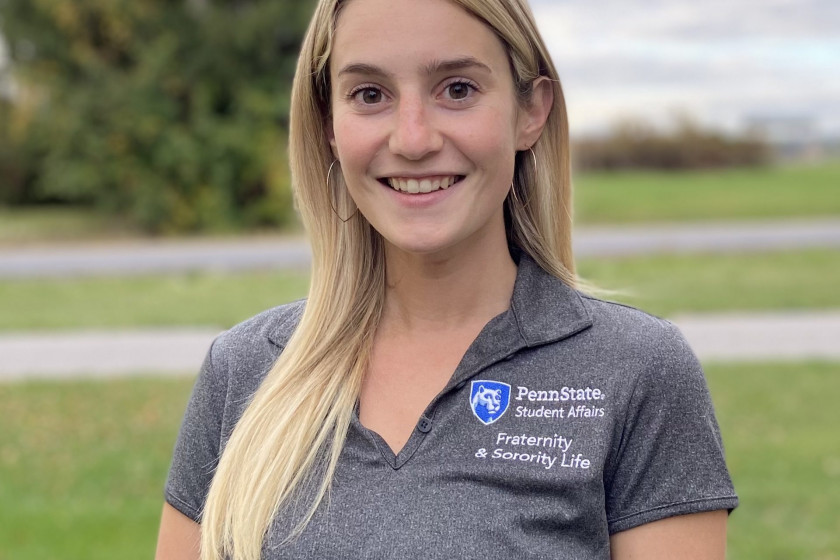
Hope McMorran (she/her/hers) graduated with a bachelor’s degree in Psychological Sciences and a minor in Human Development & Family Studies from the College of Liberal Arts and Sciences in 2018. In pursuit of a Masters in Education at Penn State University, Hope shares her story and talks about her passion to help others, valuable experiential learning opportunities, and developing post-graduation plans to achieve career goals.
How did you choose your major?
I chose Psychological Sciences because of my interests in human behavior and the brain. I didn’t know exactly what I wanted to do with my major, but I loved learning about the subject and knew I wanted to do something that would help others. I added my minor in HDFS after developing an interest in education and social services through some of my on-campus activities.
What did you do after you graduated?
I am currently pursuing a Masters of Education in the Higher Education & Student Affairs program at Penn State University. In addition to being a full-time graduate student, I work at both the Office of Fraternity & Sorority Life and the Career Services office at Penn State.
How did you find out about your current position?
I found out through the application process to my graduate program. Many departments and units in higher education have positions for graduate students to fill while they pursue their degrees.
In the Office of Fraternity & Sorority Life, I serve as a chapter coach to 12 chapters, act as the advisor to the Multicultural Greek Council, and provide support to educational programs including sexual violence prevention, alcohol and drug skills awareness, and leadership programs.
In the Career Services office, I meet with undergraduate and graduate students in career counseling appointments to discuss career topics including major and career exploration, resumes and cover letters, interviewing skills, the internship and job search, and more.
Please share two or three noteworthy internships, co-curricular activities, volunteer experiences, jobs, programs, or other degrees and certifications acquired that contributed to your current success.
Right out of UConn, I completed a post-graduate internship at the Harvard Graduate School for Education. This internship allowed me to gain more experience in the field I was interested in, which contributed to my success in landing a full-time role upon leaving Harvard.
My first full-time position was working as an Admissions Assistant at Simmons University. This position allowed me to expand my network, try out a new functional area of Higher Education, and live in a new city.
Did you overcome academic, career preparation, or job search obstacles during your time at UConn? How?
I was not sure what I wanted to do after graduation, which made the job search process difficult for me. Sorting through all of the job postings and trying to use my network without knowing what sort of positions I was looking for was challenging. I utilized the CCD, to examine my experiences and interests and eventually realized that working in Higher Education was a possibility that I didn’t even know existed! This allowed me to narrow my search, and start gaining work experience through internships with the CCD over the summer, and at Harvard post-grad. Being open to a post-graduate internship rather than a full-time position right away took time, but now I highly recommend it to those who are still exploring career options!
Were there any UConn groups, organizations, or other resources that contributed to your career success?
I was involved with the UConn Dance Company and Kappa Alpha Theta which both allowed me to build connections and gain many leadership and professional skills that I use to this day. I use professional communication, problem-solving, conflict management, and strategic planning skills that I gained from these organizations as a professional and graduate student. I also benefitted greatly from working closely with my Academic Advisor in CLAS. She helped me explore my interests inside and outside of the classroom, and find opportunities to explore the intersection of psychology and education, leading me to work in Higher Education today.
What advice would you give to current UConn students who are looking to follow the same career path?
Get involved! Whether it be joining a UConn club or organization, taking on a leadership role, or getting a part-time job in one of UConn’s many departments, getting your hands dirty in Higher Education will be fun and rewarding, no matter what kind of Education or Counseling career you might pursue.
Many students who decide to pursue a Master’s degree do so right out of undergrad, but I think taking a few years to work in the field allows you to solidify your career interests, gain work experience, and network with folks in the field. Taking a year to work and live out in the world before continuing my education was the biggest blessing in disguise.
Do you have any recent accomplishments or achievements you would like to share?
I spearheaded an important project that involved creating space for students of color from our Multicultural Greek Council and National Pan-Hellenic Council in one of our educational programs to combat sexual violence at Penn State, a program that was not previously occupied by members of these councils and identities.
